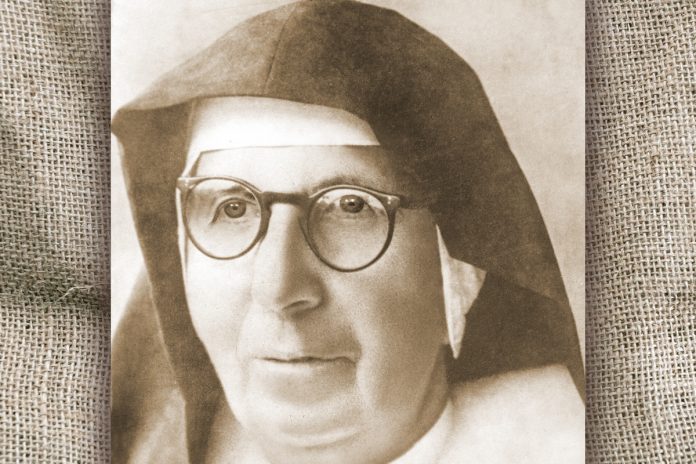Rome (Italy). 16 February 2024, marks the 141st date of birth of Blessed Maria Troncatti, Daughter of Mary Missionary Help of Christians in Ecuador (1883-1969). In her life as a passionate evangelizer-missionary, she experienced how “the educational perspective of the preventive system is the force that can involve young people in a common project of interaction and skills” (Chapter Acts XXIV).
In the mission, her presence as a madrecita totally dedicated to the mission of youth and to the help of the sick, in total self-denial, has become the springboard of the heroic charity of youth, ready even to give the gift of life.
In the decade 1930-1939, urgently called to assist a seriously ill Shuar woman, Sister Maria went there accompanied by a young Shuar proud to be at her side. On the way back, however, the Upano River swelled so much that it was very difficult for the young Juan to find the point accessible to the cross.
When he seemed to have found it, armed with a long stick, he began the crossing. Sister Maria was behind him holding his hand, walking slowly. The current was very strong. She set her foot on a smooth stone and slipped, losing her balance. She cried out, “Mary Help of Christians, Help Christians”. She had water around her neck and she felt cold. Grasping her hand tightly, the young Shuar told her to grab onto his belt and so, slowly against the current, they came to the shore.
Touching the shore, the young man began to cry and sobbed, “Oh, madrecita I was so frightened of losing you! If you died, what would become of us?” Meanwhile, after a few days, the young Shuar began to cough insistently. He had a hemoptysis and Sister Maria struggled with all her means to save his life. A few months later, the young Shuar died saying, “I die happy because I am going to heaven. I consider myself lucky to have been able to save Sister Maria’s life… her life is worth more than mine.” Sister Maria cried copiously over the sacrifice of that young man’s life in favor of hers.
Sister Maria lived the Salesian, “I will go”, typical of Valdocco and Mornese with generosity and the total gift of herself, arousing by contagion the “I will go” of Juan, who died happy for having saved the life of Sister Maria from the insidious violence of the Upano river.
In the equatorial mission, young people, faced with the witness of Sister Maria and the Salesian missionaries, were not only the object of their loving educational care, but also came to go beyond them in heroism.
How great was Sister Maria’s dedication, goodness, and self-sacrifice to make such heroism sprout in the heart of that young man?
In the magazine Missionary Youth of 1931, Sister Maria recounted how the Preventive System produced fruits of transformation in the hearts of youth and in the Shuar people:
“It is now 15 weeks that we go once a week to the Kivari of the two nearest Kivari, to bring the light of the eternal truth among that darkness and to lift up those poor souls, giving even to their bodies the relief that is possible and that is more urgent. They themselves come to pick us up in the residence to accompany us through the difficult paths. They help us wade through the famous Upano river, which is part by canoe and part on the shoulders of the Kivari themselves, who feel glorious to carry the sweet weight!”.
The words of Don Bosco in Letter 84 echoed true in the equatorial East. “Young people must not only be loved; they must feel that they are loved”. Transformed by love kindness and self-giving, the wolves became lambs, and were made capable of giving their lives for their educators.
On this particular day, a prayer chain for the intercession of Blessed Maria Troncatti calls for her canonization. From East to West, the FMA Institute, according to the wish of Mother General, Sister Chiara Cazzuola, intensifies prayer for the canonization of the great Lombard missionary in Ecuador, trusting in the Word of Jesus: “And whatever you ask in my name, I will do, so that the Father may be glorified in the Son. If you ask anything in my name, I will do it” (Jn. 14:13-14).




















